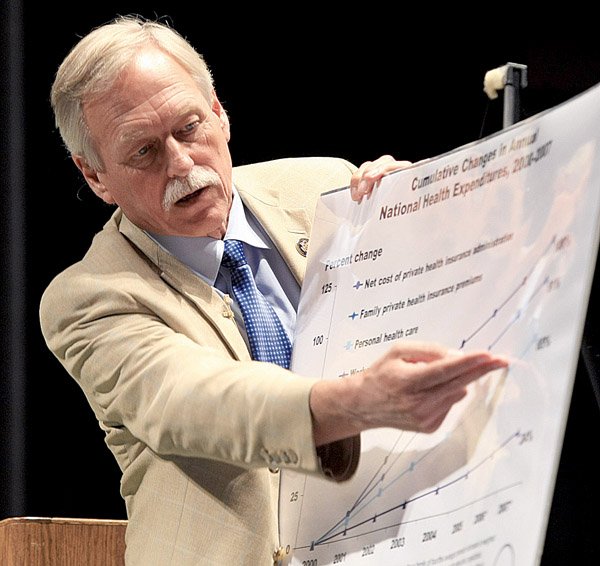CONWAY — U.S. Rep Vic Snyder said Thursday that he doesn't think a new government-run public option health plan will be part of changes to the nation's health-care system when legislation is finalized by Congress in coming months.
Nor does it need to be, he said.
"I want to keep an open mind about it, but I'm just not convinced that it adds a lot, and yet it brings out a lot of opposition," said Snyder, a Democrat who represents Arkansas' 2nd District.
The public option isn't needed, Snyder said, because the legislation has many positives that would help provide coverage for pre-existing conditions, reduce costs and provide financial assistance for those who can't afford health insurance.
Whether the federal government should offer a public option as an alternative to private health insurance continues to be one of the most contentious issues in the health-care debate. It's an emotional issue for people on both sides, Snyder said.
More than 600 people filled Reynolds Performance Hall at the University of Central Arkansas on Thursday for Synder's third town-hall meeting on proposed health-care legislation. The public option was a recurring theme.
Snyder said opponents see it as the "camel's nose under the tent" that will lead to a singlepayer system run completely by the federal government. Proponents, on the other hand, feel a public option is needed to temper private health insurance companies.
They "don't see anything to bring down rising [insurance] rates" without that competitionfrom the public sector, he said.
Toney Orr of Little Rock said he thinks a public option is needed and is frustrated at what he sees as Snyder wavering on a vital issue. Without a public option, the nation's health-care system will continue to struggle with rising costs and limited access, he said.
"You have health care, most of us don't," Orr told the congressman. "Without the public option, 10 years from now we'll be sitting around in the same place going over the same questions."
Health care is a "basic right," but too many people go without because of the high costs, Orr said.
Wes Zeigler of Little Rock said he's a Vietnam veteran who enjoys the benefits of a government-run health plan and thinks the nation needs a public option.
"If we've got nearly 50 million people in this country that can't get health insurance, they need help," Zeigler said. "I don't think we will get any better health care without the public option."
Elizabeth McClelland is a second-year student in UCA's occupational therapy program. As a mother, a student, and a future health-care professional, she said she's concerned the health-care debate is moving forward too quickly.
While she's not opposed to change, she said she's not confident the federal government has all the answers.
"I'm more concerned about the government controlling it," McClelland said.
Melody Dundee, also a second-year UCA occupational therapy student, said she's concerned about how proposed changes would be paid for. She said she doesn't want to see legislation that causes the level of care and technology available in the United States to decline, or patients to have fewer choices.
"I do think that time and significant research needs to be done before we move forward," she said.
Congress is in recess and will reconvene after Labor Day.
Before the break, three House committees passed similar versions of the 1,018-page HR3200, America's Affordable Health Choices Act. Two committees in the Senate are working on their own legislation.
Many members of Congress are using the break to hold townhall meetings to get public input on proposed legislation, and Snyder said such forums have been invaluable in learning concerns and feelings on the topic.
Some change is needed, he said. It's about more than just providing for people who don't have health insurance; it's about controlling the costs for everyone, he said.
"We do, as a country, want to do something better than we are doing right now," Snyder said. "It's not right to say, 'I've got my Blue Cross Blue Shield and to hell with the rest of them.'"
Arkansas, Pages 11, 17 on 08/28/2009
